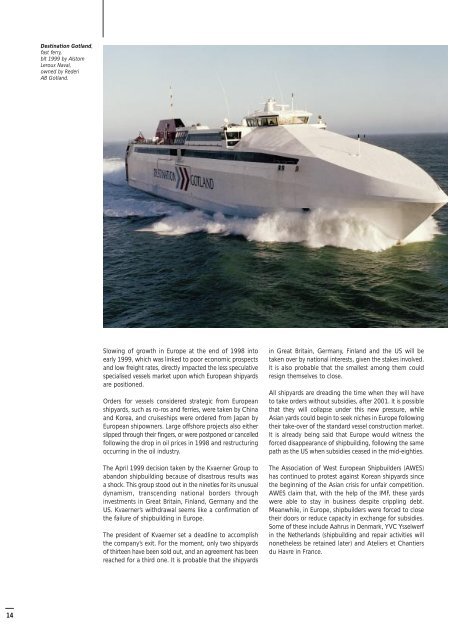You also want an ePaper? Increase the reach of your titles
YUMPU automatically turns print PDFs into web optimized ePapers that Google loves.
14<br />
Destination Gotland,<br />
fast ferry,<br />
blt 1999 by Als<strong>to</strong>m<br />
Leroux Naval,<br />
owned by Rederi<br />
AB Gotland.<br />
Slowing of growth in Europe at the end of 1998 in<strong>to</strong><br />
early 1999, which was linked <strong>to</strong> poor economic prospects<br />
and low freight rates, directly impacted the less speculative<br />
specialised vessels market upon which European <strong>shipyards</strong><br />
are positioned.<br />
Orders for vessels considered strategic from European<br />
<strong>shipyards</strong>, such as ro-ros and ferries, were taken by China<br />
and Korea, and cruiseships were ordered from Japan by<br />
European shipowners. Large offshore projects also either<br />
slipped through their fingers, or were postponed or cancelled<br />
following the drop in oil prices in 1998 and restructuring<br />
occurring in the oil industry.<br />
The April 1999 decision taken by the Kvaerner Group <strong>to</strong><br />
abandon shipbuilding because of disastrous results was<br />
a shock. This group s<strong>to</strong>od out in the nineties for its unusual<br />
dynamism, transcending national b<strong>orders</strong> through<br />
investments in Great Britain, Finland, Germany and the<br />
US. Kvaerner’s withdrawal seems like a confirmation of<br />
the failure of shipbuilding in Europe.<br />
The president of Kvaerner set a deadline <strong>to</strong> accomplish<br />
the company’s exit. For the moment, only two <strong>shipyards</strong><br />
of thirteen have been sold out, and an agreement has been<br />
reached for a third one. It is probable that the <strong>shipyards</strong><br />
in Great Britain, Germany, Finland and the US will be<br />
taken over by national interests, given the stakes involved.<br />
It is also probable that the smallest among them could<br />
resign themselves <strong>to</strong> close.<br />
All <strong>shipyards</strong> are dreading the time when they will have<br />
<strong>to</strong> take <strong>orders</strong> without subsidies, after 2001. It is possible<br />
that they will collapse under this new pressure, while<br />
Asian yards could begin <strong>to</strong> seek niches in Europe following<br />
their take-over of the standard vessel construction market.<br />
It is already being said that Europe would witness the<br />
forced disappearance of shipbuilding, following the same<br />
path as the US when subsidies ceased in the mid-eighties.<br />
The Association of West European Shipbuilders (AWES)<br />
has continued <strong>to</strong> protest against Korean <strong>shipyards</strong> since<br />
the beginning of the Asian crisis for unfair competition.<br />
AWES claim that, with the help of the IMF, these yards<br />
were able <strong>to</strong> stay in business despite crippling debt.<br />
Meanwhile, in Europe, shipbuilders were forced <strong>to</strong> close<br />
their doors or reduce capacity in exchange for subsidies.<br />
Some of these include Aahrus in Denmark, YVC Ysselwerf<br />
in the Netherlands (shipbuilding and repair activities will<br />
nonetheless be retained later) and Ateliers et Chantiers<br />
du Havre in France.


